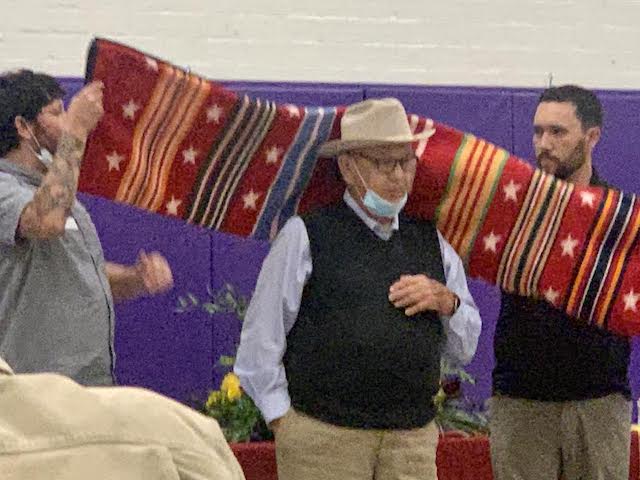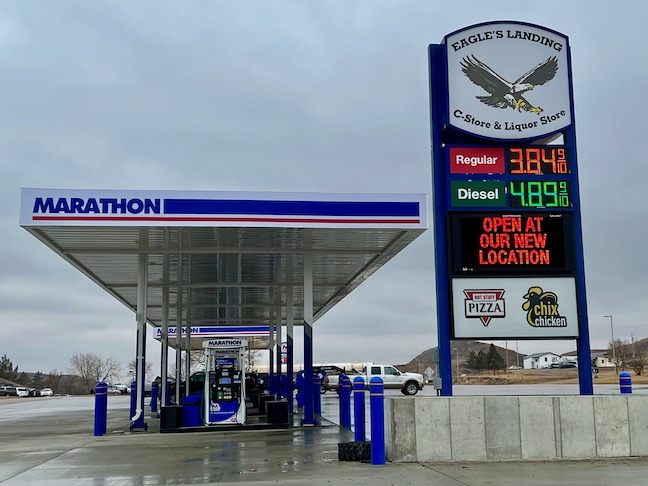Inspired by her grandparents, Tonah Fishinghawk-Chavez proves that caring for the community is an action, not just a word

Pump jacks on well pad sites such as these in December 2020 are a common scene in western North Dakota, where more than 16,000 wells have been drilled since 2007. The Bakken and Three Forks shale formations have made the state the second-highest producer of oil in the United States. It’s estimated that 20 percent of oil production occurs within the Fort Berthold Reservation. (Photo by Jodi Rave Spotted Bear/Buffalo’s Fire)
This story is part of a collaborative series, “At the Crossroads,” from the Institute for Nonprofit News, Indian Country Today, Buffalo’s Fire and eight other news partners, examining the state of the economy in Indian Country. This reporting was made possible with support from the Walton Family Foundation.
Ed Danks had just completed first grade when the U.S. Army Corps of Engineers began flooding the Fort Berthold Reservation during the mid-1950s to create the manmade Lake Sakakawea.
Danks remembers chasing a bouncing rubber ball down a slope near the family home when it rolled into the rising Missouri River. The flooding and relocation of at least 80 percent of Mandan, Hidatsa and Arikara families marks one of the last cataclysmic events to change the landscape of the reservation.

Then came the oil industry.
Today, money is flowing into the Mandan, Hidatsa and Arikara Nation at Fort Berthold, flush from the Bakken and Three Forks Shale oil boom that has swept across the western North Dakota plains and badlands.
About 20 percent oil production in North Dakota occurs on tribal lands, and McKenzie County, which includes a portion of Fort Berthold, was the fastest-growing county in the United States, during the last 10 years. Neighboring Williams County is the second-fastest-growing in the U.S.
But while the multibillion-dollar oil industry has been a boom for some, it has been a bust for others. The oil business has brought companies and oil field workers from across the country to do business in North Dakota, but Native-owned businesses say they are often cut out of the lucrative contracts.
And workers are hard to find. Some families collect oil royalties, and don’t really need to work. It’s common for a number of tribal citizens and tribal council members to own a second home, with many choosing property sites in Arizona.
Danks counts himself among the scores of Native business owners who say it has been difficult amid the oil boom. He and his two sons are sole owners of Oilfield Support Services, a company based in New Town on the Fort Berthold Reservation.
With 45 years of experience in the construction business, Danks, at 74, is a founder of First Nations Innovations, a nonprofit organization set up to help other entrepreneurs create jobs for their communities. But businesses need data and demographic information in order to develop a solid business plan, and Danks said he gets little help or information from Three Affiliated Tribes of the MHA Nation, which controls information on the reservation.
A lack of access to information coupled with a lack of recourse has forced many tribal citizens into tribal court, another venue heavily influenced by the MHA Tribal Business Council, which oversees the judiciary committee.
Attorney Don Bruce from the Turtle Mountain Reservation in North Dakota has filed several lawsuits involving entities within the Mandan, Hidatsa and Arikara Nation on behalf of Native-owned businesses.
Many tribal citizens have oil wells on their land, Bruce said. “They don’t realize this struggle — of the people who are actually working on the oil wells — that our Indian people are having.”
Oilfield jobs
Since the first oil leases were signed in 2007 on Fort Berthold, more than 16,000 wells have been drilled in western North Dakota. More than 100,000 jobs were created in just the past decade, according to the office of the MHA Nation’s Tribal Employment Rights Ordinance, known as TERO.
Danks’ Oilfield Support Services employs 35 people, none of whom is a citizen of the Mandan, Hidatsa and Arikara Nation.
The company is registered with TERO, a department managed and controlled by appointed commissioners hand-picked by the Three Affiliated Tribes business council.
An MHA tribal resolution regarding Indian preference states TERO was adopted “in order to increase employment of Indian workers and businesses and to eradicate employment discrimination within the exterior boundaries of the Fort Berthold Reservation.”
Danks’ company, under TERO guidelines and regulations, is considered a Tier 1, Native-owned business, a designation that means a firm 100 percent owned and controlled by an American Indian. The Tier 1 companies are supposed to receive first preference for contracts and subcontracts involving oil and gas exploration, production and related services.

Jake Danks, president of Oilfield Support Services and son of Ed Danks, said their 100 percent, family-owned business does a lot of work to maintain and improve production for the majority of wells that have already been drilled.
He said there are good people who work at TERO who do their best, but it can be difficult to work within TERO guidelines and regulations.
“The rules apply differently depending on where the money’s coming from and who the customer is and whose money is involved,” he said. “As a contractor, it’s frustrating because you don’t know exactly what process it is, how the rules are going to apply to you and how they’re going to be applied and if they’re going to change, because that’s the other thing, they’ll change the rules as they go along.”
The Mandan, Hidatsa and Arikara Nation’s TERO is expected to follow a long list of MHA regulations, and TERO offices operated across the country typically enforce “Indian preference” laws to ensure Native people have gainful employment, training, contracting and subcontracting opportunities on or near the reservation.
Charles Foote, TERO director for the MHA Nation, was not granted interview permission by MHA Chairman Mark Fox for this story, but he was able to share some tidbits through the tribe’s public relations officer. For example, more than 4,905 contractors have registered with the MHA office since 2012.
“Thousands of companies have come to work on the MHA Nation reservation,” Foote wrote in a truncated 250-word report. “It has created many opportunities for our tribal members in employment and entrepreneurship.”
A number of tribal business owners and lawyers, however, attest that only a select few are reaping monetary benefits associated with the extractive resource sector. Meanwhile, TERO control of jobs and contracts tends to be a financial boon for some tribal officials, TERO commissioners, friends and cronies. Then, there is the conundrum of White-owned businesses fronted by Native Americans, commonly referred to as fronts.
Bruce, the attorney, represents several Native-owned businesses in court.
“I’m trying to help the true, legitimate, Indian Tier 1-run businesses who are struggling with their business and trying to run it according to the TERO ordinance,” Bruce said. “They are undermined by the very people who are supposed to be enforcing the law.”
The oil industry, meanwhile, has generated more than $8.4 billion for the North Dakota Legacy Fund, created in 2011 under a state constitutional amendment to collect 30 percent of oil and gas gross production and extraction taxes.
But while North Dakota officials readily make the state’s oil and gas profits available to the public, details of oil revenues amassed by the Three Affiliated Tribes are not. Officials with the Bureau of Indian Affairs, which tracks revenues, have repeatedly refused requests by Buffalo’s Fire for the tribe’s oil revenue numbers.
Bribery and kickbacks
Terry Fredericks, owner of Firetail Energy Services, is among those who have filed lawsuits against TERO. His business offers trucking and flat hose services to transport water.
He has two active lawsuits in the Three Affiliated Tribes district court in New Town. A suit filed on June 25, 2018, accused TERO director Foote, deputy director Dewey Hosey and former TERO staff member Frank Delapaz of “joint corrupt management” of MHA TERO ordinances. Any responses they may have filed are not public, since tribal court documents are not considered open records.
Frederick’s suit says he built a shop, leased and purchased trucks, and hired staff and crews for his first business, Native Energy Construction, a Tier 2 business, meaning he shared a 51-49 percent majority ownership as a Native entrepreneur. He went to TERO ready to transfer water through flat hoses.
He had sought work within Mountrail, McKenzie and Dunn counties in North Dakota, according to the tribal court complaint. The work went instead to businesses where a Native person owned less than 10 percent of a company. It’s a practice allowed by TERO that takes away business from companies owned 100 percent by Native business owners.
“All the layflat hose work was lost to fronting,” he said.
In a second complaint filed June 8, 2021, against the chairman of the TERO commission, TERO director, and the MHA Department of Transportation director, the suit claims: “Instead of supporting Native companies, defendants are in a conspiracy to put Native-owned trucking companies out of business.”
Both cases are on appeal after winning unfavorable rulings in the tribal court.
TERO officials were not given permission to speak to Buffalo’s Fire for this story. A spokesperson for the tribal chairman said no one can speak to the press without the chairman’s approval. Tribal employees and members of the Tribal Business Council abide by the unwritten rule. A tribal social media policy does exist, which prohibits any tribal employee from speaking adversely about tribal officials or department heads.
Unlike states and the federal government, the MHA tribal government does not have open records or a Freedom of Information Act, creating a lack of transparency and accountability that have led to tribal and federal court lawsuits and a recent federal grand jury investigation into tribal corruption.
On March 31, former MHA Nation Councilman Frank Grady pleaded guilty to accepting bribes and kickbacks from a business owner in exchange for using his position to award projects.
One unnamed contractor – in the July 2020 federal complaint against Grady – was paid more than $17.2 million by the MHA Nation and its political districts, or segments. Grady now faces up to 20 years in prison, according to the March plea agreement.
MHA Nation elected representatives, and Grady, are also defendants in an ongoing civil suit for Racketeering Influenced Corrupt Organization, or RICO, filed March 31, 2021, by Laura “Lori” Bird of Bird Industries. That suit alleges she was put out of business by Grady and the Three Affiliated Tribes. Bird is awaiting a trial date.
Danks said he is disappointed the MHA Nation provides no data or statistics for small-business owners. During a recent visit, he walked out of a TERO employee’s office feeling dismayed.
He said he received no help or information that would help aspiring entrepreneurs. He said it was better that he left rather than stay and become rude. After decades of work in construction and doing his best, he now strives to have peace in his life.
He’s content that his two sons have plans to likely diversify the family business away from oilfield services. The Bakken and Three Forks boom hit a peak in 2019, according to a November 2021 report from the Institute for Energy Economics and Financial Analysis.
“The Bakken oil industry has been on a gut-wrenching roller coaster ride for the last two years, but it may be headed toward a long-term slide,” according to the report.
A recent U.S. Geological Survey report noted a sharp 40 percent decrease from the last estimate in recoverable oil in the shale formations.
Jake Danks said he and his family partners are thinking ahead.
The younger Danks said the family construction business largely now serves the oil industry.
“If the energy source changes, our customers will change,” he said. “We have to adapt to the times. We have to look ahead, and see that, and be prepared for the change.”
He continued, “We’re looking at alternative energy. We have friends in the industry and other companies we’ve worked with that are interested in researching, learning more about keeping an eye on trends, keeping an eye on technology, understanding how solar works and how solar can be applied in North Dakota.”
And there’s wind energy, he said.
“What kind of infrastructure will be involved in converting the grid to non-centralized power sources or to alternative energy sources?” he asked.

Changing landscape
Like his son, the elder Danks imagines better days for the people of Mandan, Hidatsa and Arikara Nation.
Ed Danks has lived through the tumultuous times of the 1950s flooding of the Fort Berthold Reservation and now the turmoil and bustle associated with the extractive resource industry.
He’s satisfied with his long career. But the talk of construction and the current uncertainties bring back memories of his childhood and the flooded homelands. Lake Sakakawea, formed by the Garrison Dam, holds court in the middle of the reservation.
Danks learned about construction from his father, James Danks, who helped build roads and airstrips while serving with a Navy construction battalion, the Seabees, during World War II. Once back home at Fort Berthold after the war ended, his father was recruited to put his military experience to work building new roads after the Army Corps of Engineers flooded the old ones.
By the time Ed Danks was 11 years old, his dad had shown him how to operate heavy equipment used to move dirt for roads.
As a child, Danks lived with his family along the Missouri River near Elbowoods, the town now submerged under Lake Sakakawea. They lived on a plateau above a long fork leading to the water.
His rubber ball, he said, “was my favorite toy.”
He still recalls the day it got away from him. He chased it down a slope, where it bounced into the rising waters of the Missouri.
“It kept floating down river,” he said. “I was running along the river, watching it, and trying to figure out how to get it.”
He could hear his mother’s voice, warning him to avoid the rising floodwaters.
“My mother was just adamant and drilled it into my head, ‘Don’t you ever go out in that water,” he told Buffalo’s Fire. “Stay away from there. I had that running through my mind and my precious ball was floating away from me.”
It took him a minute to notice his aunt Caroline Chase standing on a knoll by the water.
“I ran up there and I started to cry and I threw my arms around her leg and buried my face in her dress,” he said.
“What’s the matter? What’s the matter?” she asked.
He told her about his ball. She bent down and hugged him, providing comfort to the distraught boy. “I’ll get you another one,” she said.
He soon realized she had been watching her log home float down the river, a victim to the creation of the manmade lake.
“I just stood alongside her after a while,” he said, “and just quietly watched her log house.”
Updated: 5/10/22 (12:30pm CDT)
This story is part of a collaboration from the Institute for Nonprofit News Rural News Network in partnership with INN members Indian Country Today, Buffalo’s Fire, InvestigateWest, KOSU, New Mexico In Depth, Underscore and Wisconsin Watch, as well as partners Mvskoke Media, Osage News and Rawhide Press. Series logo by Mvskoke Creative. The project was made possible with support from the Walton Family Foundation. Buffalo’s Fire is the publishing arm of the Indigenous Media Freedom Alliance, a nonprofit media organization based on the Fort Berthold Reservation in North Dakota. Find us on Twitter and Instagram @buffalosfire or Facebook.
Jodi Rave Spotted Bear (Mandan, Hidatsa and Arikara Nation)
Founder & Editor in Chief
Location: Twin Buttes, North Dakota
Spoken Languages: English
Topic Expertise: Federal trust relationship with American Indians; Indigenous issues ranging from spirituality and environment to education and land rights
See the journalist pageEditor’s note: This story has been updated to note that McKenzie county was fastest growing county during last 10 years, according to the most recent decennial census.
© Buffalo's Fire. All rights reserved.
This article is not included in our Story Share & Care selection.The content may only be reproduced with permission from the Indigenous Media Freedom Alliance. Please see our content sharing guidelines.
Native organizations and food banks are stepping in to compensate
Dramatic play reveals power of Indigenous stories and community
Thousands peacefully protest
Appeals court to rule soon in a case first filed last year
UTTC International Powwow attendees share their rules for a fun and considerate event







